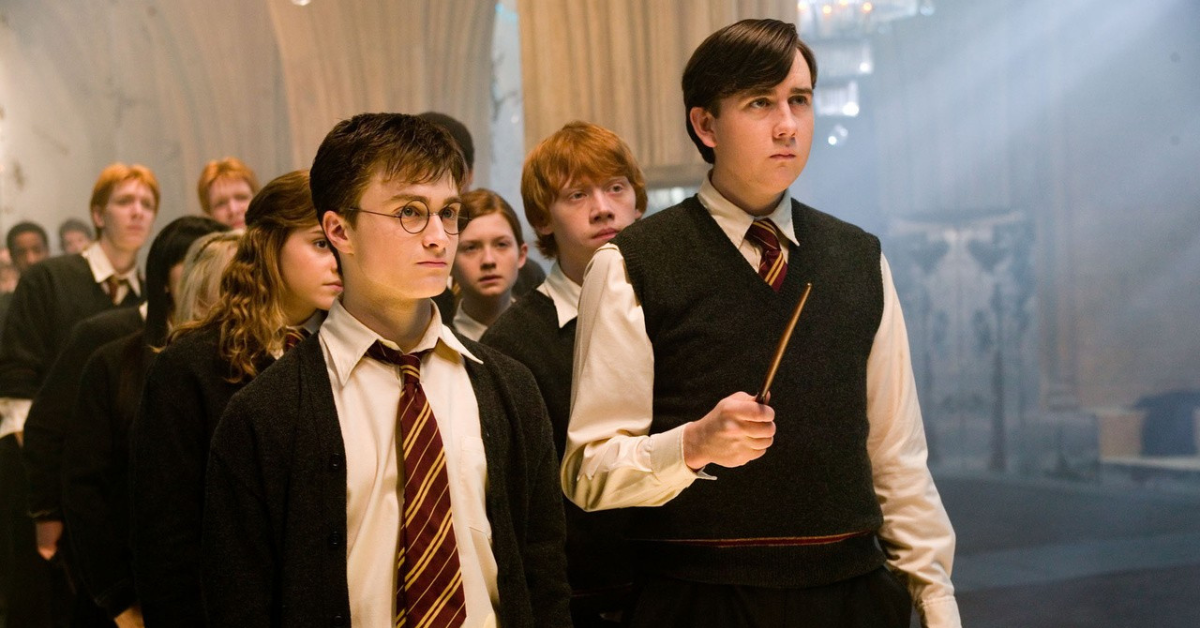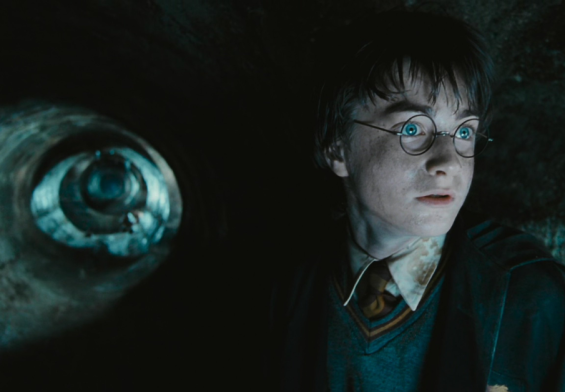
Have you ever wondered why the witches and wizards of today seem so… weak? The Hogwarts founders from the 10th century were supposed to have been four of the most skilled witches and wizards the magical world had ever seen, evidenced by the impressive magical institution they left behind.
Then, of course, there’s Merlin, another 10th-century wizard who is believed to be the most powerful wizard of all time, aptly named the Prince of Enchanters. A few centuries later, the Peverell brothers, a trio described by Dumbledore as “gifted, dangerous wizards,” succeeded in creating the powerful Deathly Hallows.
In the 14th century, along came Nicolas Flamel, who made wizarding history by creating the Philosopher’s Stone—perhaps the most powerful magical object of all time. When people talk about witches and wizards of the past, it’s as though they were so powerful that they are entirely incomparable to most modern-day witches and wizards.
In the modern era, we’ve got powerful wizards like Voldemort and Dumbledore, but they seem like exceptions to the rule. They don’t appear to be true outliers; instead, they more or less represent the level of power that wizards should have—or perhaps once had.
Recommended for You:- How Draco SAVED Harry from the BASILISK in the Chamber of Secrets
- What REALLY Happens to Your Soul after a Dementor’s Kiss
- Why Albus Dumbledore Could Have Been a Slytherin
- Unveiling the Sorting Hat: Could All Hogwarts Students End Up in One House?
The Decline of Wizarding Power
So, my question is: What happened? Why are witches and wizards so much weaker than they were in centuries prior? Is it all the Butterbeer? Today, we’re going to explore this and more as we peel back the layers of wizarding history and uncover where all that raw power went.
Hey everyone, welcome to another installment of Harry Potter Theory. I believe that the key to understanding the depreciating levels of power among wizardkind directly correlates to a dark secret in wizarding history.
A Hidden Past: Wizards and Muggles
Hear me out: In the current era, there exists a definitive line separating Muggles from magical beings, and it probably won’t surprise you to hear that this current landscape is a direct result of conflict between the two worlds.
But what you may not know is that for centuries, witches and wizards lived among Muggles and would even use their abilities to help their non-magical friends and neighbors in need. Presumably, much of the magic performed during this time was done for medicinal purposes—to help cure illness, prevent outbreaks of disease, or heal injuries.
And while dark magic surely existed and was wielded by some witches and wizards against Muggles, for the most part, there was no ill will between the two communities. But then, in the late 1700s, witches and wizards went into hiding.
The Witch Hunts and the Rise of Secrecy
Why? Because for the past couple of centuries, Muggles had begun to hunt down those with magical abilities, accusing them of worshipping the devil and participating in sinful activities, before ultimately putting them on trial and condemning many of them to death.
The first witch hunts began in the early 1300s throughout various European communities, spreading rampantly across the globe and culminating in the American town of Salem in the 1690s. Over the course of 400 years, it’s estimated that about 110,000 people were tried for witchcraft, with somewhere between 40,000 and 60,000 people convicted and then executed for these crimes.
Dumbledore’s notes in his copy of Wizard and Hopping Pot reference the environment at the time:
“The persecution of witches and wizards was gathering pace all over Europe in the early 15th century. Many in the magical community felt, and with good reason, that offering to cast a spell on the Muggle next door’s sickly pig was tantamount to volunteering to fetch the firewood for one’s own funeral pyre. ‘Let the Muggles manage without us,’ was the cry, as the wizards drew further and further apart from their non-magical brethren.”
In response to the increasingly hostile environment, significant portions of the wizarding populace were forced to start living double lives, using concealment charms to protect themselves. Eventually, in an effort to preserve their magical existence, they began to establish hidden communities within Muggle villages.
As the witch hunts grew fiercer, wizarding families began to live double lives, using charms of concealment to protect themselves and their loved ones. By the 17th century, any witch or wizard who chose to fraternize with Muggles became suspect, even an outcast in their own community.
The International Statute of Secrecy: Protection or Submission?
And this is what catalyzed the creation of the International Statute of Secrecy, a protective measure that has enabled wizarding society to remain in relative peace for centuries.
This law, first signed in 1689 and officially ratified in 1692, was created to conceal the existence of witches and wizards from the Muggle population. It was designed to safeguard the magical world through strict secrecy measures, preventing Muggles from discovering the existence of the wizarding community and their magical abilities.
But I’m not so sure that the history books are telling the full story. I think there’s more to this divide between the two worlds than we are led to believe. While history paints a picture of wizardkind being the bigger person after years of conflict and subsequently disappearing into the shadows, I’m not so sure they had much of a choice in the matter.
Forced Into Hiding: The True Story?
I don’t truly believe that wizards just up and left voluntarily. By the late 17th century, Muggle and wizard conflicts had hit an all-time high, with plenty of bloodshed and casualties on both sides.
And it’s these escalating tensions and violence that created a precarious and volatile environment, with both communities vying for power and control. The brutal clashes and devastating consequences of these conflicts had pushed the magical community to the brink, leading to a deep-seated fear of persecution and annihilation at the hands of the Muggles.
This is when witches and wizards started going into hiding and living double lives. However, the unchecked power and advancements of the Muggles had become a formidable threat to the magical world, and the wizards found themselves in a disadvantaged position, fighting to preserve their way of life and protect their kind.
The Decline of Powerful Bloodlines
I suspect that the overwhelming influence and resources of the Muggles may have eventually left the magical community without any more options. By this stage, wizardkind had lost their most powerful defenders at the hands of Muggle forces, which would explain why there’s such an absence of powerful figures in the modern era.
The more powerful and talented bloodlines were simply killed off, and I think that eventually, in the war between Muggles and wizards, the Muggles actually won. It’s not that the wizards wanted to go into hiding; they were forced there. And I suspect that the International Statute of Secrecy was never a voluntary choice made by wizards, but actually a measure forced upon them by the dominant power of the non-magical world.
Muggle Influence: The Ministry of Magic
And it certainly wouldn’t have been the only Muggle-made decision that was implemented. Prior to 1707, the Wizards’ Council was the longest-serving body to govern the magical community in Britain. But after the imposition of the International Statute of Secrecy in 1692, the wizarding community suddenly decided that they needed a more highly structured, organized, and complex governing structure than they had used previously.
This is when the Ministry of Magic was formed, and it all sort of sounds like something the Muggles would have orchestrated to:
- Further establish control
- Ensure that wizards stay out of the Muggle world under the guise of keeping wizards safe
- Suppress magical power
The Wizards’ Council sounds like the name of a self-contained magical government, but the Ministry of Magic sounds more like a sub-department of something larger—like, oh, I dunno, the Muggle Government.
The Ministry’s True Role
There are clues in the books suggesting that the Ministry actually answers to the Muggle Government. In the fourth book, it’s revealed that the Minister of Magic was required to tell the Prime Minister that he was bringing a dangerous magical creature into the country—a dragon.
But this level of correspondence seems unusual and oddly accommodating for a magical government that was literally forced into hiding to stay alive. I can’t imagine why they would have these sorts of self-imposed rules, unless that rule was put in place by the Muggles.
Suppression of Magical Power
The whole goal of the Ministry of Magic, besides introducing some level of law and order, is ensuring that the International Statute of Secrecy is maintained. But I don’t think they’re looking at it from the right perspective.
We’re led to believe that they are upholding the International Statute of Secrecy to stay hidden from Muggles and protect wizardkind. But I think the Ministry is actually a Muggle-made and controlled department with a few primary goals:
- Keep wizards away from Muggles
- Keep them hidden in the shadows
In essence, these two perspectives share the same goal, but the main differentiator is how wizards perceive themselves. In one scenario, wizards are looking out for themselves and doing what they believe is best for their species. In the other, wizardkind is a subjugated group that lost a war and is now being manipulated into hiding itself.
The Illusion of Control
The entire government is actually a clever plan to make wizards believe they are doing this to themselves. After centuries of living under this bureaucracy, its policies have become part of the very culture of magic.
The subtle manipulation and control exerted through the government, education system, and legal frameworks have served to perpetuate a sense of self-regulation and compliance among wizardkind. By fostering the illusion of agency and autonomy within the magical community, the governing bodies have effectively maintained their dominance and influence over the fate of wizards and witches.
Muggle Domination
The seamless integration of these structures into the fabric of magical society has obscured the true extent of external influence and manipulation exerted by the Muggles. As generations have passed under the guise of self-governance, the mechanisms of control have become so deeply entrenched that many within the magical community may not even question the underlying motives and power dynamics at play.
The normalization of subjugation and compliance has perpetuated a cycle of obedience and conformity, further cementing the hegemonic control of the Muggle authorities over the magical world.
The Vanishing of Powerful Wizards
As for the noticeable lack of powerful wizarding figures in the modern era, I think this governmental structure helps explain that as well.
While the most powerful bloodlines may have been lost during the peak of the war, I suspect that subsequent subjugation from the prevailing Muggles has ensured that no witches or wizards achieve that level of power again.
By controlling the government, educational system, and laws, they could suppress the magical community’s power quite effectively. It’s hard to believe that the two worlds could ever truly separate, especially considering how intertwined they once were. This could be the answer to how true separation was finally achieved.
What Do You Think?
What do you think? Is this theory as ridiculous as Hagrid wearing a tie, or am I possibly onto something? Feel free to poke holes in this one as I know it’s not the most ironclad. It was just fun to theorize on.



